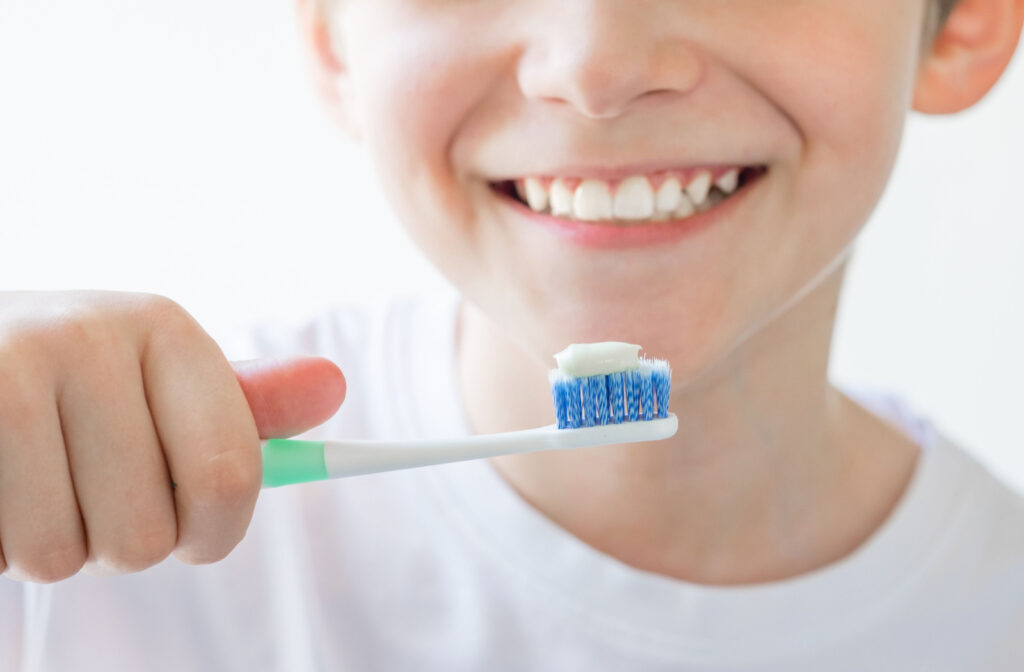Many patients want brighter, whiter smiles but don’t know how to achieve their desired results. You may have heard about fluoride during a dental exam or saw it listed as an ingredient on a tube of toothpaste, but can this mineral help whiten your teeth?
Fluoride doesn’t whiten your teeth, but it helps protect them from tooth decay and strengthen your enamel. It plays an important role in your dental health. However, some at-home and professional teeth-whitening options are available to help brighten your smile.
What Is Fluoride?
Fluoride is a naturally occurring mineral found in water, plants, rocks, and the air and helps strengthen your enamel, the tooth’s tough outer layer. It has several uses in dentistry and is added to:
- Mouthwash
- Toothpaste
- Supplements
These applications contribute to maintaining strong, healthy teeth. Your dentist may also suggest a fluoride treatment during your checkup to help reinforce the tooth’s enamel.
How Does Fluoride Work?
When you use fluoride toothpaste or mouthwash, it gets absorbed into your teeth, making them more resistant to acid attacks from plaque bacteria and sugary foods and inhibiting bacteria growth in your mouth, reducing the risk of gum disease.
When bacteria in your mouth combine with sugars from food and beverages, it produces plaque, which slowly eats away at your enamel. Your enamel contains minerals like calcium and phosphate, which are essential for keeping your teeth strong. However, when plaque bacteria produce acid, it depletes these minerals from your enamel, weakening it and leaving it susceptible to decay.
This is called demineralization, which is the step before a cavity forms.
Fluoride helps prevent this process by strengthening the enamel and making it more difficult for plaque to cause demineralization. It also promotes remineralization, where calcium and phosphate ions are absorbed back into the enamel, repairing small areas of damage.
Are There Risks to Using Fluoride?
Fluoride use has been a topic of debate, with both benefits and potential risks associated with its use. Some opponents argue that consuming too much fluoride can lead to health problems such as dental fluorosis, a condition where white spots or streaks appear on the teeth. However, these cases are rare and typically occur when children consume excessive amounts of fluoride during tooth development (between ages 3 months and 8 years).
The Canadian Dental Association (CDA) supports fluoride for preventing tooth decay and promoting oral health. The benefits of using fluoride far outweigh any potential risks.
What Causes Tooth Discolouration?
Tooth discolouration happens naturally with time, but other factors can influence its severity. There are 2 types of tooth discolouration: extrinsic and intrinsic.
Extrinsic discolouration occurs on the surface of the teeth and is caused by external elements. Intrinsic discolouration happens inside the teeth and can be caused by genetics, medication, and trauma to the tooth.
Common causes of tooth discolouration include:
- Tea
- Coffee
- Tobacco use
- Chocolate
- Red sauces
- Red wine
- Age
- Injury
While tooth discolouration is natural (no one has naturally bright, white teeth), many people desire a brighter smile.

How Can You Whiten Your Teeth?
Teeth whitening uses a bleaching agent, typically hydrogen peroxide, to break down stains on the surface of the teeth. This chemical reaction causes the stain to become colourless, resulting in a whiter appearance.
Both at-home and professional whitening methods are available. Teeth whitening is generally considered safe when done correctly and using dentist-approved methods.
At-Home Whitening
At-home teeth whitening uses bleach products that are typically weaker than those used by professionals. These products come in gels, strips, and trays that are applied directly to the teeth. You can also find whitening toothpastes or rinses. This teeth whitening method is generally cheaper than visiting a professional but isn’t as effective.
While at-home teeth whitening can be appealing, you may not be satisfied with the results if you hope to get your teeth several shades lighter.
Professional Whitening
Professional teeth whitening takes place at your dentist’s office. Because your dentist handles the bleaching agents used in the treatment, the bleach is stronger and more effective, providing better results than at-home options.
While professional teeth whitening can cost more than at-home options, you may find it more effective.
Enjoy a Whiter Smile
Fluoride can help protect your teeth from cavities, but it isn’t a way to whiten your teeth. Your dentist can help whiten your smile, helping you achieve your desired look. Reach out to our team at Arch King West Dental if you’re interested in teeth whitening. We can help determine if it’s right for your needs.


